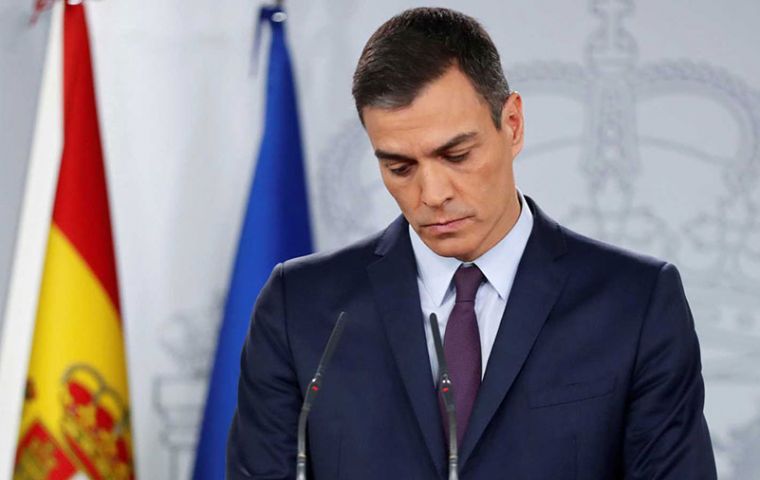MercoPress. South Atlantic News Agency
Spanish elections: hung parliament and the extreme right doubles seats
 The poor result, means more political headaches for Spain’s leader Sánchez and leaves the country facing another hung parliament.
The poor result, means more political headaches for Spain’s leader Sánchez and leaves the country facing another hung parliament. Spain's Socialists have won the country’s fourth general election in as many years, but without an absolute majority. The PSOE, led by acting Prime Minister Pedro Sanchez, has taken just 120 seats out of a possible 350 – three less than the April 28 election, while the extreme right Vox party doubled its number of seats
The poor result – after 100% of the votes have been counted – means more political headaches for Spain’s leader and leaves the country facing another hung parliament.
Sanchez will be forced once again into talks with the anti-austerity Podemos party, which saw its seats in Parliament decrease by seven to 35.
Podemos leader Pablo Iglesias said, ‘starting tomorrow’, he would get back around the negotiating table with Sanchez.
It comes after Sanchez called these elections when talks between the two left wing parties broke down and no government could be formed.
The other main story of election night was the success of the far right Vox party, which has campaigned on a platform of anti-immigration and pledges to get tough on Catalunya’s independence movement.
Led by Santiago Abascal, the party has taken 52 seats, more than doubling the 24 it took in April’s vote. Vox was the largest party in several areas across the Costa del Sol and Andalucia, including Estepona (26.7%), Benahavis (31.77%), Coin (29.4%) and Alhaurin el Grande (31.77%).
The rise of the far right, which Spain had resisted until recently, unlike other European countries, is coupled with the demolition of Spain’s centrist party, Ciudadanos.
Its leader, Albert Rivera, said he will not resign, despite his party shedding 2.5 million votes and only gaining 10 seats – 47 fewer than last time.
Spain now faces an unlikely coalition of smaller parties, along with the larger PSOE and Podemos, in order to reach the required majority of 176.
The seats gained by socialist breakaway party Mas Pais, the ERC and JxCAT will be needed to reach a majority.
However, a left wing block of the PSOE, Podemos and Mas Pais only adds up to 159 seats, 17 short of a majority.
Meanwhile, a right wing coalition of the PP, Ciudadanos and Vox similarly falls short with a total of 150.
In effect results showed the rightwing Popular Party coming second with 84, up from 66 in the previous poll.
In recent days, Sanchez has repeatedly raised the alarm about Vox's “aggressive ultra-rightwing” policies, warning the party would drag the country back to the dark days of Franco's dictatorship.
The campaign took place on the heels of a fresh unrest in Catalonia after Spain's Supreme Court sentenced nine Catalan leaders to lengthy jail terms over their role in a failed 2017 independence bid.
The Oct 14 ruling triggered days of mass protests in Barcelona and other Catalan cities, which by night descended into chaos, with demonstrators torching barricades and hurling rocks and Molotov cocktails at police who hit back with water canon, tear gas and foam bullets. More than 600 people were injured, around half of them police.
As the crisis gathered pace, Sanchez came under increasingly harsh criticism from the right, particularly from Vox leader Santiago Abascal who demanded Madrid suspend Catalan autonomy and arrest regional president Quim Torra.
At his final rally on Friday, Abascal - who wants all separatist parties banned - said “drastic solutions” were needed as his supporters chanted: “Torra to the dungeon!”
With his rallying cry of “Spaniards first” and rage against those who would betray the unity of Spain, Abascal has capitalised on the crisis, leading to a surge in support for his far-right faction.
Spain has been mired in political paralysis for four years since Podemos and business-friendly Ciudadanos entered parliament following a December 2015 election that shattered the decades-long hegemony of the Socialists and conservative Popular Party (PP).
And there is there is a good risk Sunday's vote will only prolong the agony in the eurozone's fourth-largest economy.
With no single party able to secure the required 176 seats for a majority, the Socialists are likely to opt for a minority government - but that would only work if the PP abstained in an investiture vote, said Teneo analyst Antonio Barroso.




Top Comments
Disclaimer & comment rulesCommenting for this story is now closed.
If you have a Facebook account, become a fan and comment on our Facebook Page!